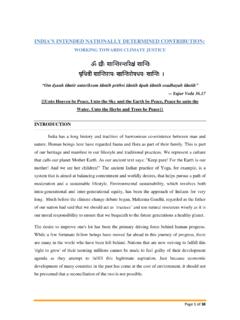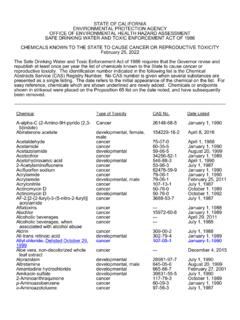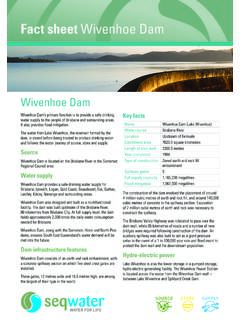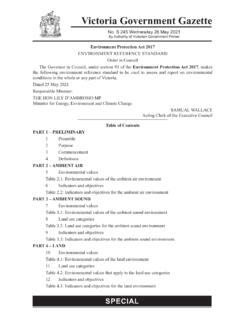Transcription of Nutrition & Food Safety Policy - Goolwa Children's Centre
1 Nutrition & Food Safety Policy National Quality Standards (NQS). Our Service recognises the importance of healthy eating to the growth and development of young children and is committed to supporting the healthy food and drink choices of children in their care. This Policy concerns the provision of healthy food and drink while children are in care and the promotion of normal growth and development. We are committed to implementing the healthy eating key messages outlined in Munch & Move and to supporting the National Healthy Eating Guidelines for Early Childhood Settings as outlined in the Get Up &.
2 Grow resources. Furthermore, our Service recognises the importance of supporting families in providing healthy food and drink to their children. It is acknowledged that the early childhood setting has an important role in supporting families in healthy eating. Quality Area 2: Children's Health and Safety Each child's health is promoted. Each child's health needs are supported. Healthy eating is promoted and food and drinks provided by the service are nutritious and appropriate for each child. Education and Care Services National Regulations Children (Education and Care Services) National Law 77 Health, hygiene and safe food practices 78 Food and beverages 79 Service providing food and beverages 80 Weekly menu 90 Medical conditions Policy 91 Medical conditions Policy to be provided to parents 162 Health information to be kept in enrolment record 168 Education and care service must have policies and procedures Early Years Learning Framework Learning Outcome 3.
3 Children take increasingly responsibility for their own health and physical wellbeing. Nutrition & Food Safety Policy Childcare Centre Desktop / Childcare Policies / QA2. PURPOSE. Early childhood education and care (ECEC) Services are required by legislation to ensure the provision of healthy foods and drinks that meet the requirements for children according to the Australian Dietary Guidelines. It is essential that our Service partners with families to provide education about Nutrition , and promote healthy eating habits for young children to positively influence their health and wellbeing.
4 Dietary and healthy eating habits formed in the early years are shown to continue into adulthood and can reduce the risk factors associated with adult chronic conditions such as obesity, type 2 diabetes and cardiovascular disease. Our Service recognises the importance of healthy eating for the growth, development and wellbeing of young children and is committed to promoting and supporting healthy food and drink choices for children in our care. This Policy affirms our position on the provision of healthy food and drink while children are in our care and the promotion and education of healthy choices for optimum Nutrition We believe in providing a positive eating environment that reflects dietary requirements, cultural and family values, and promotes lifelong learning for children.
5 As we commit to implementing and embedding the healthy eating key messages outlined in the NSW Health's Munch & Move program into our curriculum and to support the National Healthy Eating Guidelines for Early Childhood Settings outlined in the Get Up & Grow resources. SCOPE. This Policy applies to children, families, staff, and management of the service. IMPLEMENTATION. Our service has a responsibility to help children to develop good food practices and approaches, by working with families and educators. All food prepared by the Service or families will endeavour to be consistent with the Australian Dietary Guidelines and provide children with 50% of the recommended dietary intake for all nutrients.
6 Food will be served at various times throughout the day to cater for all Children's nutritional needs. Meal times reflect a relaxed and pleasant environment where educators engage in meaningful conversations with children. When possible, educators will role model healthy eating behaviour .This assists in creating a positive and enjoyable eating environment. All kitchens and food preparation areas shall comply with Food Standards Australia and New Zealand. (FSANZ). Nutrition & Food Safety Policy Childcare Centre Desktop / Childcare Policies / QA2.
7 Encourage and support breastfeeding and appropriate introduction of solid foods Our Service will: Provide a suitable place within the service where mothers can breastfeed their babies or express breast milk. Support mothers to continue breastfeeding until babies are at least 12 months of age while offering appropriate complementary foods from around 6 months of age. Ensure the safe handling of breast milk and infant formula including transporting, storing, thawing, warming, preparing and bottle feeding. Always bottle-feed babies by holding baby in a semi-upright position.
8 Always supervise babies while drinking and eating - ensuring safe bottle-feeding and eating practices at all times. Promote healthy food and drinks based on the Australian Guide to Healthy Eating and the Dietary Guidelines for Children and Adolescents. Our Service will: Where food is brought from home: Provide information to families on the types of foods and drinks recommended for children and suitable for Children's lunchboxes. Encourage children to eat the more nutritious foods provided in their lunchbox, such as sandwiches, fruit, cheese and yoghurt, before eating any less nutritious food provided.
9 Discourage the provision of highly processed snack foods high in fat, salt and sugar and low in essential nutrients in Children's lunchboxes. Examples of these foods include lollies, chocolates, sweet biscuits, muesli bars, breakfast bars, fruit filled bars, chips, oven-baked crackers and corn chips. Management/Nominated Supervisor/Educators will: Ensure water is readily available for children to drink throughout the day in both the indoor and outdoor environment. Be aware of children with food allergies, food intolerances and special diets and consult with families to develop individual management plans.
10 Ensure young children do not have access to foods that may cause choking. Ensure all children remain seated while eating and drinking. Ensure all children are always supervised children while eating and drinking. Educators will follow the guidelines for serving different types of food and the serving sizes in the Guidelines and may use the Australian Government eat for health calculator Display nutritional information for families and keep them regularly updated. Ensure infants are fed individually by educators Ensure age and developmentally appropriately utensils and furniture will be provided for each child.






